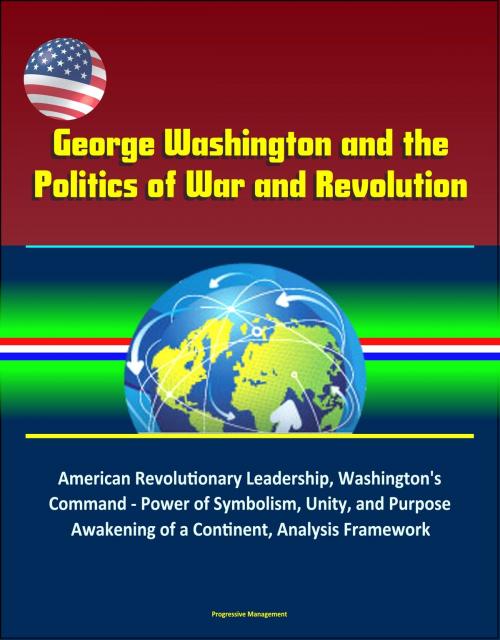George Washington and the Politics of War and Revolution: American Revolutionary Leadership, Washington's Command - Power of Symbolism, Unity, and Purpose, Awakening of a Continent, Analysis Framework
Nonfiction, History, Americas, United States, Revolutionary Period (1775-1800), Military| Author: | Progressive Management | ISBN: | 9781370664979 |
| Publisher: | Progressive Management | Publication: | February 23, 2017 |
| Imprint: | Smashwords Edition | Language: | English |
| Author: | Progressive Management |
| ISBN: | 9781370664979 |
| Publisher: | Progressive Management |
| Publication: | February 23, 2017 |
| Imprint: | Smashwords Edition |
| Language: | English |
This excellent report has been professionally converted for accurate flowing-text e-book format reproduction. The outcome of the American Revolution was never inevitable. A military victory against British forces was a necessary but not sufficient condition to create a stable political structure in colonial America. Divisive social and political forces throughout the colonies weighed heavily on political elites prior to the outbreak of revolution. One actor, however, stood at the critical nexus of ideology, politics, culture, and military power to affect the outcome of the American Revolution and preserve the nascent political union in those precarious opening months of the conflict.
War is a social and, in turn, a political phenomenon. However, analysis of leadership in war often overlooks war's inherently political nature. How a leader manages or operates within a political system to preserve or generate political will while simultaneously weakening the will of an adversary is a critical, if often overlooked, component of leadership in war. George Washington was a remarkable paradox; both a congruent output from the social system he was a part of and a remarkably aberrant agent when compared to his contemporaries. Washington's impact on the social and political system of the colonies emerged in two distinct phases. First, Washington's innate leadership qualities and personal narrative secured political support among colonial elites at the Second Continental Congress and validated his selection as the commander of the newly formed Continental Army. Second, Washington, in concert with practical military requirements, navigated the political straits of the conflict by accounting for ideology, identity, and the colonial military tradition as he executed his siege of Boston. In doing so, Washington protected what most observers and many colonial commentators believed was the underlying weakness of the revolution: colonial disunity.
George Washington is one of the most analyzed and dissected figures in American history. Washington's military campaigns, including the 1776 disasters in New Jersey and New York, the crossing of the Delaware River, and eventual victory at Yorktown in 1781, have inspired innumerable commentaries and analyses. However, war is a social phenomenon. "The dry bones of 'drum and bugle' history," as historian Don Higginbotham described it, has lacked sufficient social and political context to illuminate the power and influence of individual decision makers in their fuller context.2 An analysis of leadership in war that ignores the social and political environment, and instead focuses on the maneuvers, the logistics, and the engagements, rejects a critical component of generalship. That notwithstanding, some historians have indeed framed Washington's role in the Revolution from a social and political perspective.
This excellent report has been professionally converted for accurate flowing-text e-book format reproduction. The outcome of the American Revolution was never inevitable. A military victory against British forces was a necessary but not sufficient condition to create a stable political structure in colonial America. Divisive social and political forces throughout the colonies weighed heavily on political elites prior to the outbreak of revolution. One actor, however, stood at the critical nexus of ideology, politics, culture, and military power to affect the outcome of the American Revolution and preserve the nascent political union in those precarious opening months of the conflict.
War is a social and, in turn, a political phenomenon. However, analysis of leadership in war often overlooks war's inherently political nature. How a leader manages or operates within a political system to preserve or generate political will while simultaneously weakening the will of an adversary is a critical, if often overlooked, component of leadership in war. George Washington was a remarkable paradox; both a congruent output from the social system he was a part of and a remarkably aberrant agent when compared to his contemporaries. Washington's impact on the social and political system of the colonies emerged in two distinct phases. First, Washington's innate leadership qualities and personal narrative secured political support among colonial elites at the Second Continental Congress and validated his selection as the commander of the newly formed Continental Army. Second, Washington, in concert with practical military requirements, navigated the political straits of the conflict by accounting for ideology, identity, and the colonial military tradition as he executed his siege of Boston. In doing so, Washington protected what most observers and many colonial commentators believed was the underlying weakness of the revolution: colonial disunity.
George Washington is one of the most analyzed and dissected figures in American history. Washington's military campaigns, including the 1776 disasters in New Jersey and New York, the crossing of the Delaware River, and eventual victory at Yorktown in 1781, have inspired innumerable commentaries and analyses. However, war is a social phenomenon. "The dry bones of 'drum and bugle' history," as historian Don Higginbotham described it, has lacked sufficient social and political context to illuminate the power and influence of individual decision makers in their fuller context.2 An analysis of leadership in war that ignores the social and political environment, and instead focuses on the maneuvers, the logistics, and the engagements, rejects a critical component of generalship. That notwithstanding, some historians have indeed framed Washington's role in the Revolution from a social and political perspective.















